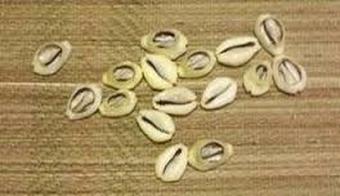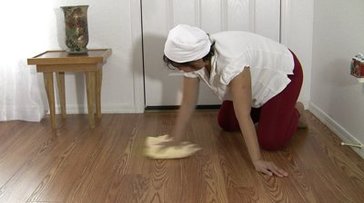 What can you do to fix your problem?
What can you do to fix your problem? Most people come for a consulta or reading with the cowrie shells when they're facing a daunting problem. They confront obstacles, things are going wrong in their life, they feel confused and unable to move forward. Getting a consulta will usually shed some light on the problem, and if it comes in osorbo (misfortune), part of the divination process consists of determining how to fix it. Usually, this involves an ebbó (sacrifice) of some kind.
Outsiders to the religion immediately assume this means animal or blood sacrifice, because popular television shows and movies tend to focus on that aspect of the religion whenever a Santero makes his way into the plot. Newspapers and the internet publish "human interest stories" that link Santeria to abandoned animal carcasses found in a park and a deranged individual trying to do "witchcraft" to his neighbors or boss. In fact, most forms of ebbó don't involve blood at all, and they certainly don't involve witchcraft.
Outsiders to the religion immediately assume this means animal or blood sacrifice, because popular television shows and movies tend to focus on that aspect of the religion whenever a Santero makes his way into the plot. Newspapers and the internet publish "human interest stories" that link Santeria to abandoned animal carcasses found in a park and a deranged individual trying to do "witchcraft" to his neighbors or boss. In fact, most forms of ebbó don't involve blood at all, and they certainly don't involve witchcraft.
Ebbó Can Be Simple
 Fruit can be offered to any Orisha
Fruit can be offered to any Orisha One of the simplest and most effective ebbós is "omi tutu" (fresh, cool water). Water can be offered to cool down a situation, or to refresh and purify the energy surrounding the individual. Sometimes fruits and vegetables are offered - a coconut, a squash, some oranges or bananas. Ebbó can also take the form of a cooked food, something that is ritually associated with a particular Orisha, like merengues for Obatalá and cooked okra for Changó. These plates of food can be placed before the Orishas (your own, if you have been initiated and have received the Orichas in the kariocha ceremony, your godparent's Orishas, or those of the person who is doing the consulta for you.) Through divination, the appropriate offering is determined, along with the number of days to leave it, and where it should be discarded. Because our religion is very respectful of nature, when an offering needs to be left at the foot of a tall tree or at the ocean shore, we're very conscious of how it will impact the environment, and we make every attempt to give the offering in a way that won't produce contamination or litter. Generally, the food left in nature will be eaten by animals, birds or fish, and any remainder will break down and feed the soil, adding nutrients to it.
In a modern, urban world, this can become complicated. Obviously, food left sitting out can attract rodents or insects. Common sense dictates that things be done in a way that won't cause health hazards to people in the house or the community. Above all, our religion is practical and can adapt itself to conditions such as crowded city life. Many offerings of food, especially fruits and candies, can be consumed by humans after they have been given to the Orishas. The food takes on the aché of the Orishas and brings blessings to those who consume it. Another destination for many ebbós is simply the garbage can. After the offering is made, it can remain in front of the Orishas for a specified time and then be thrown away. Divination determines what's needed, and how to deal with it.
In a modern, urban world, this can become complicated. Obviously, food left sitting out can attract rodents or insects. Common sense dictates that things be done in a way that won't cause health hazards to people in the house or the community. Above all, our religion is practical and can adapt itself to conditions such as crowded city life. Many offerings of food, especially fruits and candies, can be consumed by humans after they have been given to the Orishas. The food takes on the aché of the Orishas and brings blessings to those who consume it. Another destination for many ebbós is simply the garbage can. After the offering is made, it can remain in front of the Orishas for a specified time and then be thrown away. Divination determines what's needed, and how to deal with it.
Spiritual Cleansing
 Cleanse your mind and home of clutter
Cleanse your mind and home of clutter Other forms of ebbó involve a ritual cleansing of some kind. This can be a "head rogation," a ceremony that cools down the head and brings peace of mind to the person. There are also ceremonial baths with specific herbs, flowers, and sometimes perfumes or other ingredients like honey or milk that will restore balance and harmony to the person's life. Another form of spiritual cleaning involves cleaning the house, either with a specially prepared solution containing herbs and other ingredients, or simply tidying up and sweeping dust out of the corners. Some people think of these rituals as "magic," but there is also a psychological factor. Cleaning is therapeutic, and having a tidy house can free the mind of clutter. Ritual bathing and head-cleansing are soothing and give the person time to cool down and reflect on his situation in a peaceful setting.
Making Changes from Within
 Is your behavior the problem?
Is your behavior the problem? These forms of ebbó can be helpful and go far toward solving a problem, but the most powerful ebbó sometimes is to listen to advice and modify behavior as needed. In other words, the Orishas will do their part if the individual is willing to do his. Through a consulta, sometimes it becomes obvious that the person's problems are caused by his own character or behavior. A stubborn person can back himself into a corner and refuse to budge. In order to resolve his problem, he might need to become more flexible and open-minded, in order to seek a solution outside his comfort zone. A person who behaves arrogantly might find he has enemies at work. His ebbó might be to develop humility and stop saying "I know" all the time. His enemies might change their mind about him if he changes the way he behaves around them. Someone who has a hot temper might be told to avoid situations where there are large crowds of people consuming alcohol. These are situations where fights might break out, and he could easily lose his temper and end up in jail. Depending on how serious the osorbo is, the problem might take years to correct, but behavior modification over time will eventually clear up the osorbo and allow the individual to have a more rewarding life.
The diviner has to be diplomatic and deliver the information in a way that the individual will accept. It's not always easy to hear the truth, that your problems are at least in part of your own making. It's important that the person coming for the reading understand that it's not the diviner who is passing judgment on him or finding fault with his character. The diviner speaks on behalf of the Orishas, and the Orishas know people better than we know ourselves. They can see what the problem is and tell us how to fix it, but we have to be willing to listen and take action. Like parents who guide their children through difficult moments in life, the Orishas help us avert disaster by asking us to make ebbó.
The diviner has to be diplomatic and deliver the information in a way that the individual will accept. It's not always easy to hear the truth, that your problems are at least in part of your own making. It's important that the person coming for the reading understand that it's not the diviner who is passing judgment on him or finding fault with his character. The diviner speaks on behalf of the Orishas, and the Orishas know people better than we know ourselves. They can see what the problem is and tell us how to fix it, but we have to be willing to listen and take action. Like parents who guide their children through difficult moments in life, the Orishas help us avert disaster by asking us to make ebbó.
Sometimes There's No Solution
 Some things can't be helped
Some things can't be helped There are times, however, when the obstacles can't be removed. They're there for a reason, perhaps to teach us a lesson, or perhaps because they're part of our destiny on earth. Life consists of ups and downs. We can't always be fortunate, because if we never experienced misfortune, we couldn't appreciate the good things that come our way. In order for good to exist, there has to be bad. This is one of the fundamental principles of our religion. If you're facing a problem and go for a consulta, one possible outcome is that you will be told you just have to hang in there and live though the problem, there is nothing to be done, things are happening as they're supposed to happen. Ebbó can mitigate the problem or give you the strength and courage to live through it. But there are some problems that you're meant to experience, and you can't avoid them.
Health problems, for example, deserve a separate mention. Responsible diviners will always tell people who have a health issue: go see a doctor. A consulta can reveal you have a health problem, but it's something a doctor needs to verify. You may need medication. You may need surgery. You may be told to offer ebbó to make sure the surgery goes well or the medication resolves the problem, but the religion alone never replaces medical care. Many santeros are talented herbalists and can offer recipes for infusions and folk remedies to help with minor health complaints. However, they are not doctors, and they don't try to pretend they are.
So, can you avert disaster? Yes, many times you can. If you catch the problem early, get good advice through a consulta, and make ebbó, you can make osorbo go away. If you keep your life in balance, you can avoid attracting more osorbo into your life, and you can enjoy more blessings. However, even the most fortunate of human beings will face problems at some point in life, and sometimes those problems are part of their destiny. They can't go away. We have to learn to live with them. A consulta with a good diviner will help you know if the problems can be remedied and how. The goal of all humans is to live out our destiny on earth, and die at the time we are meant to die, not before our time is up. We make ebbó so that our life won't be cut short, and we can enjoy the time we have here.
Health problems, for example, deserve a separate mention. Responsible diviners will always tell people who have a health issue: go see a doctor. A consulta can reveal you have a health problem, but it's something a doctor needs to verify. You may need medication. You may need surgery. You may be told to offer ebbó to make sure the surgery goes well or the medication resolves the problem, but the religion alone never replaces medical care. Many santeros are talented herbalists and can offer recipes for infusions and folk remedies to help with minor health complaints. However, they are not doctors, and they don't try to pretend they are.
So, can you avert disaster? Yes, many times you can. If you catch the problem early, get good advice through a consulta, and make ebbó, you can make osorbo go away. If you keep your life in balance, you can avoid attracting more osorbo into your life, and you can enjoy more blessings. However, even the most fortunate of human beings will face problems at some point in life, and sometimes those problems are part of their destiny. They can't go away. We have to learn to live with them. A consulta with a good diviner will help you know if the problems can be remedied and how. The goal of all humans is to live out our destiny on earth, and die at the time we are meant to die, not before our time is up. We make ebbó so that our life won't be cut short, and we can enjoy the time we have here.
 RSS Feed
RSS Feed
